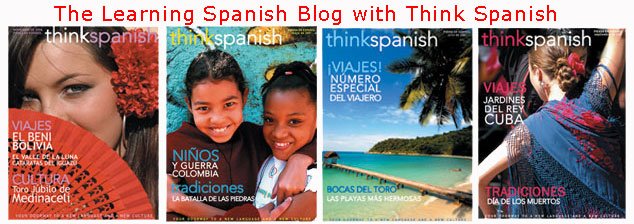In the Spanish language many idioms are used that relate to parts of the human body. In this article we show some you of the ones we have using different body parts as well as different movements. If you know some "body idioms" not listed here please share them with us!PELO - HAIRNo tener pelos en la lengua: not to mince words -- Le dije que era un sinvergüenza porque yo no tengo pelos en la lengua. I told him he was shameless because I don´t mince words.
Poner los pelos de punta: to give someone the creeps -- Sólo pensar en el accidente me pone los pelos de punta. Thinking about the accident gives me the creeps.
Tomarle el pelo a alguien: to pull someone´s leg -- Sus amigos le están tomando el pelo. His friends are pulling his leg.CABEZA - HEADcalentar la cabeza: to worry about something. Ya se arreglará, no te calientes más la cabeza. It will be be all right, don’t worry about it.
escarmentar en cabeza ajena: to learn from somebody else’s mistakes
Aunque se lo advertí, nadie escarmienta en cabeza ajena. Although I warned them, nobody learns from somebody else’s mistakes.
ser la cabeza pensante: to be the brains. Es la cabeza pensante de la banda. He’s the brains of the band.tener la cabeza dura: to be stubborn, obstinate Vaya cabeza dura que tiene ese hombre. That man’s so stubborn.en cabeza / a la cabeza: in the first place. Nuestro equipo va en cabeza. Our team is in first place.BRAZO - ARMNo dar su brazo a torcer: not to give in, to stand firm El testarudo de Luis no da su brazo a torcer. Luis is so stubborn he doesn´t give in.
Cruzarse de brazos: to fold one´s arms, not to do anything María se cruzó de brazos y esperó a que los demás dejaran de discutir. María folded her arms (didn´t do anything) and waited for the others to stop arguing.PIERNA - LEGDormir a pierna suelta/tendida: to sleep soundly Estaba tan cansado que durmió a pierna suelta toda la noche. He was so tired he slept soundly all night long.
Salir por piernas: a.) rush out of a place b.) used to indicate that relationships (usually business) had an unpleasant outcome. Querían armar un lío en el bar, entonces salimos por piernas. People wanted to pick up a fuss at the bar, so we rushed out.
Espero que no tengas que salir por piernas de esa empresa. I hope everything works out at this company.
DEDO - TOE
Para chuparse los dedos: delicious, scrumptious La paella estaba para chuparse los dedos. The paella was delicious/scrumptious.
Elegir / nombrar a dedo: to give someone a job, arbitrarilyLa nueva secretaria fue elegida a dedo. The new secretary was given the job.
SPANISH BODY IDIOMS: MOVEMENTS AND POSITIONS
A cuatro patas/pies / a gatas: crawling, on all fours
El túnel era tan bajo y estrecho que tuve que pasar a gatas. The tunnel was so low and narrow that I had to pass on all fours.
Boca arriba / boca abajo: face up / face down
Prefiero dormir boca abajo, pero desde el accidente tengo que dormir boca arriba. I prefer to sleep face down, but since the accident I have to sleep face up.
De pie: standing
Estaba tan borracho que apenas podía ponerse de pie. He was so drunk he could barely stand up.
A pie: on foot
Ella tuvo que hacer el camino hasta su casa en Alameda a pie. She had to make her way to her home at Alameda on foot.
De puntillas: on one’s tiptoes
¿Por qué caminas de puntillas? Why are you walking on your tiptoes?
De rodillas, arrodillado/a: kneeling, on one’s knees
Francisco cayó de rodillas sobre el césped. Francisco dropped to his knees on the lawn.
A la pata coja: hopping
“Mira, Papá”, dijo Suzy, entrando en la habitación a la pata coja. “Look, Dad”, Suzy said, as she entered the room hopping.
Dormir a pierna suelta / como un tronco: to sleep quietly / like a log
Aquella noche dormí como un tronco. I slept like a log that night.
De lado: on one’s side / sideways
Los cangrejos se mueven mucho más rápido cuando andan de lado. Crabs move much more quickly when walking sideways.
A hombros: on one’s shoulders
Bob llevaba a su hija a hombros. Bob Carried his daughter on his shoulders.
Llevar a caballito: to give a piggyback ride
Bobby llevó a su hermana pequeña a caballito. Bobby gave his little sister a piggyback ride.
 Notes in Spanish brings you free, fun, up-to-date and authentic Spanish audio conversations between Marina, a 'Madrileña', and her British husband Ben, who has lived in Spain for the last ten years. Although Ben is practically bilingual, he still makes the occasional mistake, which is when Marina's instant corrections are invaluable: they help correct the same mistakes most Spanish learners make all the time! It's a really useful learning experience.
Notes in Spanish brings you free, fun, up-to-date and authentic Spanish audio conversations between Marina, a 'Madrileña', and her British husband Ben, who has lived in Spain for the last ten years. Although Ben is practically bilingual, he still makes the occasional mistake, which is when Marina's instant corrections are invaluable: they help correct the same mistakes most Spanish learners make all the time! It's a really useful learning experience.


.jpg)


